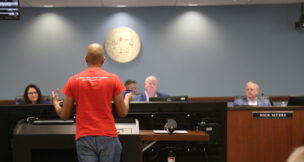A cap on credit card interest could cut off lifelines for Black entrepreneurs
Herbert W. Jackson Sr., Guest Commentary//November 10, 2025//
A cap on credit card interest could cut off lifelines for Black entrepreneurs
Herbert W. Jackson Sr., Guest Commentary//November 10, 2025//

At Greater Phoenix Urban League, we support minorities striving to achieve economic independence. Every day, we work with individuals across Arizona who are navigating an increasingly difficult economic landscape, one defined by rising costs, supply chain disruptions and stricter credit conditions.
It’s from this lens — one grounded in community experience and economic reality — that I must speak out against a federal proposal to cap credit card interest rates. While the intent behind this proposal may be to protect consumers, the consequences could be devastating for Black and brown families and minority owned businesses in Arizona and across the country.
For generations, Black Americans have faced systemic barriers to accessing affordable credit. From redlining and discriminatory lending practices to underrepresentation in traditional banking systems, Black families/entrepreneurs have often been forced to rely on alternative forms of credit, like credit cards, to bridge the gap.
In our community, credit cards are not just used for consumer spending. They are survival tools. They help cover unexpected medical bills, keep food on the table during hard times, support the needs of family members, and, for many of the small-business owners we serve, they’re the first and only line of credit available to launch or sustain a business. For younger members of our community, many of whom aspire to launch a business or are trying to build their credit, access to credit cards can be the difference between gaining a foothold in this economy and being shut out altogether.
Capping interest rates doesn’t address the root causes of predatory lending or financial inequity. Instead, it risks cutting off credit altogether for those who are already marginalized by traditional financial systems.
Furthermore, small businesses, especially those owned by Black entrepreneurs, already face immense difficulty accessing capital. According to the Federal Reserve, Black business owners are more likely to be denied loans and less likely to receive the full amount requested compared to their white counterparts. As a result, many are required to use their personal credit cards to fund operations, purchase inventory, or invest in marketing.
If interest rate caps are implemented, banks and card issuers are likely to respond not by offering cheaper credit, but by tightening approval standards or eliminating higher-risk borrowers altogether. That means many of the entrepreneurs we serve, those with no credit history, lower incomes, or past financial setbacks, could find themselves completely locked out of the credit market.
While protecting consumers from high interest rates is important, we must also consider other alternatives that will allow us to build an economy that works for everyone. That includes making sure Black families have access to the same financial tools that many others use. Additionally, increasing the number of Community Development Financial Institutions that provide key financial services in historically underserved communities would be an excellent choice.
At the Urban League, we believe that economic equity means creating pathways, not barriers. Capping credit card interest rates may sound like a protective measure, but in practice, it could pull up the financial ladder just as Black families and small businesses are beginning to climb it.
It is vital that leaders in Congress engage directly with the communities this proposal would affect most. Talk to the Black entrepreneurs fighting to keep their businesses afloat. Listen to the families using credit to survive inflation and job disruptions. And work with organizations like ours to design policies that empower rather than exclude.
Economic justice requires nuance, not blunt instruments. We must build solutions that recognize and support the lived experiences of our communities.
Herbert W. Jackson Sr. is vice president of housing initiatives for the Greater Phoenix Urban League.














































